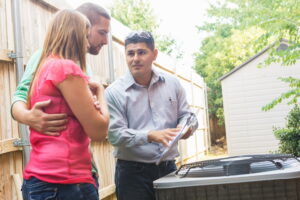HVAC repairs can vary greatly from one heating system to another. Below we are highlighting some common repairs for heat pumps, air conditioners, and heaters. No matter what type of HVAC system you have installed in your home, you can use this guide to identify problems early and get them fixed before your HVAC unit breaks down completely.
Just give us a call anytime you need HVAC repair in Los Angeles. Our team can help with all of your problems, big and small. You can also keep reading to learn more about common repairs for different types of HVAC systems. If you notice any of the signs below, it is important to schedule service sooner rather than later.
Common Heat Pump Repairs
There are two common repairs that are unique to heat pumps. The first is a broken reversing valve. The reversing valve is what allows your heat pump to switch between heating and cooling modes. As your heat pump ages, the valve can wear down and get stuck in one position or the other.
When you move your thermostat settings from heating to cooling or vice versa, the reversing valve may get stuck in a single mode. This can make it seem like your heat pump is not turning on. Really, the component just needs to be replaced. It’s usually a simple and inexpensive fix.
If you have a mini split system, a common issue with this particular system is when one of the air handlers stops heating or cooling. The other units are working fine, but one particular unit isn’t behaving. This can be caused by a number of things such as a dirty air filter, a disconnect in the wiring for that unit, or perhaps the batteries for that remote control need to be replaced.
Common AC Repairs
Just like heat pumps, air conditioners can also have ice that develops on the coils. However, ice usually develops on the coils that are on the inside unit instead of the outside unit. The most common problem with air conditioners is a lack of cooling.
Cool air can diminish when there are airflow blockages for some reason or because of ice developing on the evaporator coils on the inside unit. When ice develops, the refrigerant cannot absorb heat to cool down the air. As a result, lukewarm air will blow out of the vents around your home. It’s equally possible that that is because of a refrigerant leak instead of ice developing on the coils.
If refrigerant leaks out of your air conditioner and the charge is not strong enough to absorb heat and cool down the air, the result will be lukewarm air. You may not know which of these two problems is contributing to a lack of cool air. Just schedule an appointment with our team, and we can troubleshoot to get down to the root cause of the problem to fix it so that your air conditioner is cooling once again.
Common Heating Repairs
We get calls about heating repairs for the various types of heating elements. If you have a gas furnace, that would be the igniter. For an electric furnace, you may have problems with the burners or heating elements. Heaters have a variety of safety functions that can shut your heater down in the middle of a cycle if anything problematic is happening during operation.
For example, if the flame inside of a gas furnace grows too large, your furnace may shut down as a precaution. Or if your electric furnace gets too hot and begins overheating, those safety functions will kick in to turn your furnace off.
While this can seem like a hassle, it is only to keep your family safe from potential fire hazards. Our team can troubleshoot your heater and find out why it is turning off early during a cycle. We can fix those problems so that your heater can keep your house warm and do so safely.
JMS Air Conditioning and Heating has your back. Call us today to schedule an appointment for HVAC repairs in Glendale, CA!


